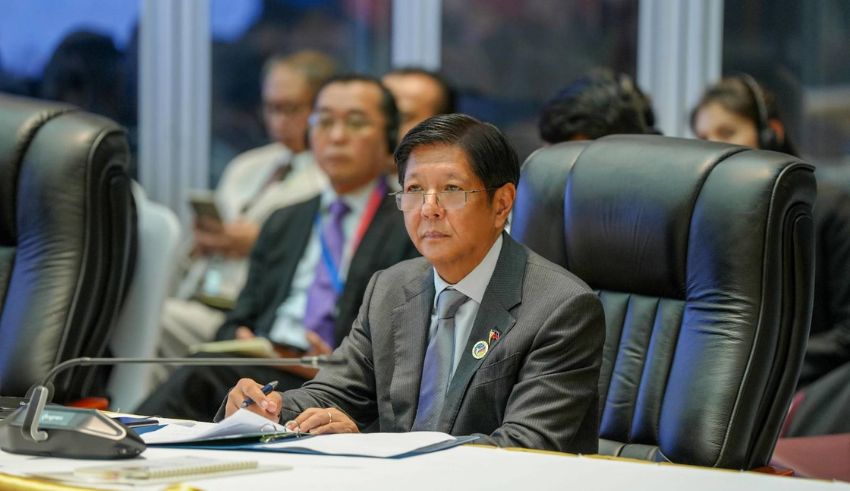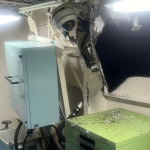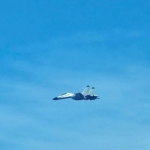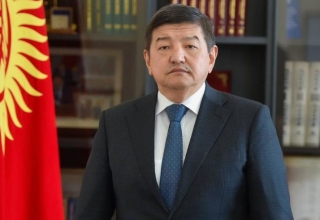
On Friday at the 44th and 45th ASEAN Summits in Vientiane, Lao PDR, President Ferdinand Marcos Jr. sent a forceful message to international leaders emphasizing China’s mounting activities in the South China Sea. Emphasizing that the dangers of miscalculation and more escalation still exist, Marcos Jr. cautioned China’s behavior “cannot be ignored,” in his speech at the ASEAN-East Asia Summit (EAS). His intervention underlined how urgently the long-standing maritime conflicts afflicting the area should be resolved.
Marcos Jr. reported many events involving China’s vessels and the Philippine Coast Guard. Within the 200-nautical mile exclusive economic zone (EEZ), he alluded to illegal activities by Chinese ships involving blast horns, water cannons, and ramming of Philippine boats. These acts, he said, are against international maritime rules and yet threaten regional peace and security.
“These kinds of behavior cannot be disregarded; demand of us concerted and serious efforts to really manage our disputes in the South China Sea,” Marcos Jr. said. He underlined that although there have been some encouraging local improvements, they have not changed the general state of the South China Sea. Tensions remain high as China keeps its aggressive posturing. The President noted that one especially concerning occurrence happened just 17 nautical miles off the Philippine shore, far inside the country’s Exclusive Economic Zone and a startling 600 nautical miles from mainland China.
Marcos Jr. Demand Faster ASEAN-China Code of Conduct Negotiations
Marcos Jr. also voiced annoyance at the extended negotiations between China and ASEAN on the much awaited Code of Conduct (COC) in the South China Sea. The COC is meant to be a consensus agreement with explicit guidelines on how nations should resolve their strategic waterway conflicts amicably. Still, differences on important subjects have caused delays in the finalizing of the text despite decades of negotiations.
While debates on the COC started in the 1990s, a Declaration on the Conduct of Parties in the South China Sea was agreed just in 2002. Since then, development has been slow and no specific agreement is in place to settle the continuous conflicts. Marcos Jr. attacked the “slow pace” of negotiations during his speech, contending that it has prevented ASEAN members from tackling fundamental COC issues. He noted that even vocabulary about fundamental ideas like “self-restraint,” has not yet been decided upon.
The Filipino president also underlined that although a complete settlement of the South China Sea problems is still unattainable, all sides have to be “conscientious and honest” in handling the conflict. Emphasizing that multilateralism and joint action define the peace and development of the region, he urged ASEAN countries and China to confront the problem with openness and sincerity.
Reclamation and militarization efforts by China attract criticism
China has kept reclamation and militarization efforts in the South China Sea while parties have been locked in talks. These acts directly contradict a 2016 international arbitration decision rejecting China’s broad assertions to almost all of the sea. Delivered by the Permanent Court of Arbitration in The Hague, this decision said that under international law China’s “nine-dash line” claim lacked legal foundation. China has however continued to create artificial islands, erect military bases, and send its navy and coast guard to monitor contested areas.
Keep Reading
With trillions of dollars’ worth of seaborne products traveling through it yearly, the South China Sea is among the most strategic waterways in the world. Control of this area has major consequences for world trade and energy security as well as for regional peace. Many ASEAN countries—including the Philippines, Vietnam, Malaysia, Brunei—have made territorial claims in the area that frequently coincide with China’s large claims. Incidents between Chinese warships and those of other claimants have become more common, which increases tensions.
China Says South China Sea Is “Generally Stable”
China has constantly minimized the tensions in the South China Sea in response to growing concerns. Just before the ASEAN Summit, on October 10, Chinese Foreign Ministry spokesman Mao Ning said the state of the South China Sea was “generally stable.” Based on “respecting historical facts and international law,” Mao emphasized China’s will to resolve maritime disputes with concerned nations by means of negotiation and consultation.
Mao says China is still committed to collaborating with ASEAN to forward the talks for the COC and “jointly make the South China Sea a sea of peace, friendship, and cooperation.” Critics counter that China’s actions in the area point to another narrative. The continuous militarization of the South China Sea and frequent conflicts with other claims point to Beijing’s aspirations in the area still rising.
The Way Forward: An Appeal for Harmony and Cooperation
President Marcos Jr. underlined the need for regional unity in confronting the strategic challenge presented by the South China Sea as he was finishing his remarks. He urged everyone to have open lines of communication and pursue lowering of tensions. “We all have to remain open so as to seriously manage differences and lower tensions,” he stated.
The leader of the Philippines further underlined the need of maintaining the present global order in which every state’s sovereignty and territorial integrity are honored and conflicts are resolved amicably. “Only the preservation of this order, where the sovereignty, territorial integrity, and political independence of all states, and the peaceful settlement of disputes are upheld, provides the greatest assurance of peace for this and future generations,” he said.
The remarks made by Marcos Jr. at the ASEAN conference reflect the mounting worries of several South-east Asian countries whose territorial borders have been invaded by China’s increasing sway. ASEAN and China are still negotiating the COC, hence the road to settle the South China Sea problems stays difficult. Still, Marcos Jr.’s comments remind us that the whole community has to keep alert in defending international law and making sure the area is calm and safe.
























